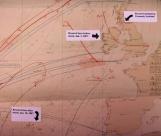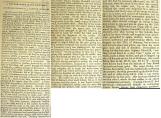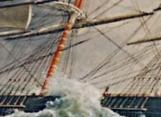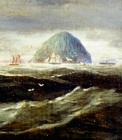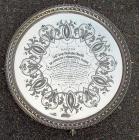28
Somehow or other, about the turn of the year, the leaking, rudderless, cripples 'Research' had traversed the Western Ocean from the Straits of Belle Isle to a position within fifty miles of Tory Island at the north of Ireland. Then she was about one hundred miles, as the gull flies, from her port of destination. And then, - the gale came round to eastward, dead in her teeth. 'A series of hurricanes and heavy seas' drove her back and back, south and west, out into the Atlantic, eighteen hundred miles out of her course.30
Away from the north of Ireland to the neighbourhood of the Azores, the 'Research' was scourged and driven. Still more harm was done her by the hammering seas. They 'swept the decks, stove in the hatches and carried away bulwarks.' With Scottish reserve, 'The Glasgow Daily Herald' remarks: 'The officers and men were frequently greatly exhausted, and upon several occasions the crew desired the captain and officers to give up the ship.''Don't give up the ship!' is a famous watchword. George Churchill had not the slightest intention of giving up his ship, even when he had still stronger inducements to abandon her. Backed by his splendid nephew, and cheery, courageous, determined George Marshall, the captain of the 'Research' persuaded his crew to remain at their duty, when their situation seemed desperate and their labour all in vain.
32
On January 10th, in spite of the ocean's spite, Churchill prepared to send down his main-yard to form the stock of a new rudder. That he was ready to sacrifice this important spar shows the extremity of the 'Research'.Three days later, the sixth rudder was constructed, and after 'several mishaps' was got into place. Rudder Number Six was not carried away by the turbulent seas; it lasted until January 25th, but it was not large enough to control the big ship effectively. Still it was better then nothing, and, with its aid, Churchill the unconquerable, navigated the 'Research' towards Greenock.
34
On January 16th, she spoke the ship 'Empress Eugenie', Collins, master, homeward bound from San Francisco. Across the stormy sea, whipping signal flags told her story. Both ships hove-to; and the boat of the 'Research' rowed off for provisions. After such a long voyage, the 'Empress Eugenie' could not have had much beef and biscuit to spare, but she did what she could to help a sister in distress. The very next day, the steamer 'Palmyra', Watson, master, also on her way to Liverpool from New York hove in sight and stopped to assist the crippled but unbeaten 'Research'. From both these vessels, Churchill received 'great kindness and friendly offers of aid.' From both he accepted sorely needed supplies, but he refused to be taken off. An abandoned ship may mean a total wreck; but it may also mean big salvage, almost the value of ship and cargo. Pride, interest, duty forbade him to take the easy way out of his difficulties; and he stuck to his ship.When she reached Liverpool, the 'Palmyra' thoughtfully telegraphed Lindsay & Co. that she had spoken the 'Research' and supplied her with provisions. This was welcome news to the consignees, for they had long ago given her up for lost, and were even then arranging for the insurance on the ship and cargo.
Rudder Number Six could not be dislodged, but it was not working well. Churchill built a seventh on an improved plan. It was begun on January 25th, and, 'after several ineffectual and heart-breaking efforts', was shipped two days later. The last line was hardly hauled taut, the rudderstock was hardly home in the rudder-casing, when the stock broke and left it disabled. So Rudder Number Seven is out of the saga.
36
By this time, the 'Research' had clawed back from the neighbourhood of the Azores to the south of Ireland. The unbreakable resolution of the master was overcoming every difficulty. Churchill built another rudder, and on the first day of February, about 185 miles south-west of Cape Clear, it was shipped without mishap. Practice makes perfect. Rudder Number Eight was a success. With this triumph of perseverance, the luck of the 'Research' changed; the wind became favourable, and urged her up the Irish Channel. At Ailsa Craig, she fell in with a tug, and accepted a tow. It was no disgrace. After a voyage of eighty-eight days, under her own sail, with the aid of her eight improvised rudders, the 'Research' had made port. She was hauled to the Wooden Wharf at the Tail of the Bank. Next day "The Glasgow Daily Herald" printed a brief item of shipping news: -'Greenock: Arrived, February 5th, 'Research', Churchill, from Québec with timber.'
That is all the landsmen would learn of the long duel between the spirit of man and the rage of the ocean. And the man won.
40
This tale has a happy ending. To the three unconquerable Nova Scotians came tangible rewards for their conduct as well as gratifying and well-earned words of praise. On March 10th there was a notable gathering of gentlemen in the Underwriters' Room of the Glasgow Exchange. They were convened for the purpose of presenting Captain Churchill and his two officers with various testimonials 'in approbation of their conduct while in charge of their vessel on her voyage from Québec to the Clyde'. Of the Glasgow Underwriters, - douce, home-keeping bodies, - not one was interested personally in the ship or cargo, to the extent of a penny-piece; but they knew how to admire pluck and perseverance. They put their hands in their pockets and bought a silver salver for Captain Churchill, engraved in plain terms with the record of his great exploit. The Chairman of Lloyds sent him a letter commending his 'indomitable perseverance'. The Union Marine Insurance Company presented him with a gold watch and chain, and a purse of sixty sovereigns.Churchill's achievement is unique in the annals of the sea; and, to the end of his days, he was famous among his brother captains as 'Rudder' Churchill.
